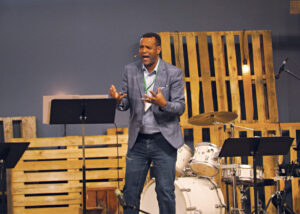I was a young adult in the time of the boycotts of South Africa. They were debated at length among my friends. How could it be right to boycott oranges from South Africa when that would negatively impact the masses of farm labourers in the country?
Then I moved to Lesotho, with my husband, to serve with Mennonite Central Committee. Lesotho is a tiny country completely surrounded by South Africa. We were there during the boycotts, a few years before the first democratic elections in South Africa in 1994. We learned that the boycotts were requested and supported by the South Africa Council of Churches. We also learned that the boycotts that had the most impact on white South Africans were the sports boycotts, where South Africans were banned from international sporting events like the Olympics, rugby, cricket and soccer.
These days we hear concerns about corruption in FIFA—the body governing world soccer, including the World Cup—and the International Olympic Committee, as well as serious questions about human rights in Qatar, the country that hosted the recent World Cup. Those are all valid concerns. Is it right to boycott watching the World Cup or the Olympics, when that will negatively impact the masses of athletes who are eager to compete?
Recently I read the news about Roman Catholic priests who were transferred from the Mount Cashel orphanage in Newfoundland to schools in British Columbia, where they continued their abuse of boys. I know the Mount Cashel stories resulted in a lot of Catholics (and non-Catholics) coming to the conclusion that they are “done” with church. This is their way of boycotting a corrupt system. Every new story of a church leader in any denomination who has broken trust through sexual misconduct validates these boycotts.
Similarly, the stories of the impact of multi-generational trauma of residential schools on Indigenous people raise questions about how on earth churches could participate in cultural genocide.
Is it right then to boycott the church?
Corruption is dishonest or fraudulent behaviour, providing benefits to the individual, while harming other individuals and preventing benefit to the larger society. Corruption is often understood to involve money, but I prefer a larger definition that focuses on self-benefit over societal benefit. Self-protection and self-benefit are choices we all make in our lives, although the degree to which they harm other individuals and broader society vary greatly. Institutions and corporations struggle to balance benefits to their constituents or shareholders with societal benefits.
I boycotted South African oranges in the 1980s. I paid TSN for the benefit of watching the World Cup last year. I invest deeply in the church at all levels. Am I less radical in my 60s than I was in my 20s? Or am I more radical now, by choosing to invest in the church in an era when many have written the church off as corrupt, irrelevant and harmful?
I continue to choose hope that the Holy Spirit is at work in the church today. Yes, part of that is dismantling institutional systems that are too often focused on self-preservation instead of societal benefits. And yes, the bigger part is having the eyes to see where the Spirit is at work, not just in individuals, but in the church, as a diverse, inclusive, caring faith community where transformation of ourselves and the world around us is taking place. That is radical hope.
Arli Klassen serves as moderator of Mennonite Church Eastern Canada and as coordinator of regional representatives for Mennonite World Conference.
Read more The Church Here and There columns:
Indonesian peacemaking
50 years of change
Can we see it?
These are our people
What holds us together?








Leave a Reply
You must be logged in to post a comment.